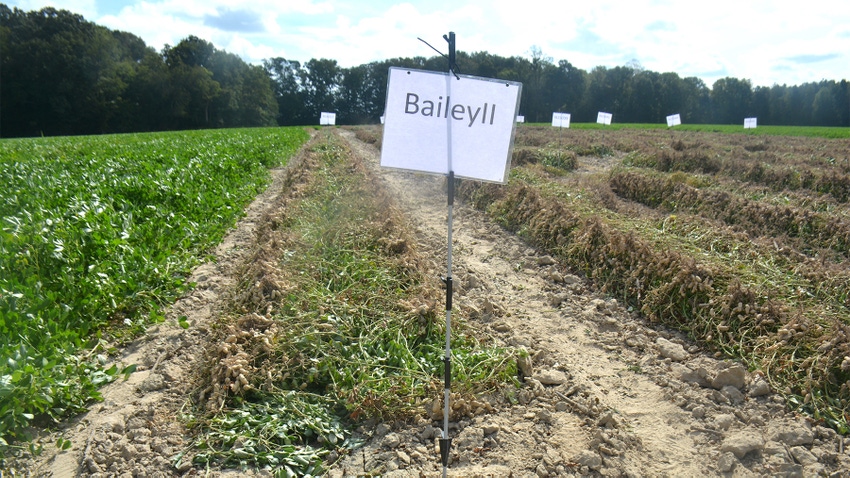
At a Glance
- The top variety grown in North Carolina today is the high-oleic Bailey II Virginia-type.
- NC 20 and NC 21 are new varieties that maintain yield when left in the field after reaching optimum maturity.
David Jordan, North Carolina State University’s Extension peanut specialist, makes it clear that North Carolina will remain a Virginia-type peanut growing state for a long, long time to come. He doesn’t expect farmers to switch over to runner-type varieties in a big way anytime soon.
Virginias are a large-pod peanut used primarily for the in-shell market and cocktail peanuts. Major league baseball fans who enjoy peanuts while watching America’s pastime are munching on Virginia-types.
Runners are primarily used for the peanut butter market. North Carolina, South Carolina, and Virginia have been historic Virginia-type producing states, while Alabama, Georgia, and Florida have been historic runner-type producers. South Carolina is often considered a borderline state because it produces both runners and Virginias, but it is still mostly a runner-type state.
Jordan says there is market demand from shellers for runners grown in North Carolina, but Virginia-types are still the driver for the North Carolina peanut market and will be for the foreseeable future. He says North Carolina, South Carolina, and Virginia are well suited for growing Virginia-types with their soil and climate.
Jordan said the top variety grown in North Carolina today is the high-oleic Bailey II Virginia-type, developed by the N.C. State breeding program. He said Bailey II is now grown on 70% of North Carolina’s peanut acres, based on certified seed sales. Runner-type varieties are grown on just 5,000 of North Carolina’s 120,000 peanut acres.
Jordan said Bailey II and Emery, another Virginia-type high-oleic cultivar developed by N.C. State’s breeding program, will be the top varieties for at least the next five years. Sullivan is a Virginia-type that is decreasing in acreage in the state. Still, N.C. State’s breeding program, lead by peanut breeder Jeff Dunne, continues to develop new Virginia-type cultivars for farmers to plant in the future.
The newer varieties he develops will have a place in the market and with growers as we learn more about them at the farm level.“We’re going to be a two Virgina type market for the foreseeable future. I don’t know what NC 20 and NC 21 are going to do for sure until we see them on more acres and see how they compare to Bailey II,” Jordan said at a late season peanut disease tour Sept. 27 at the Peanut Belt Research Station in Lewiston-Woodville. “They do have characteristics that will fit well in our production systems.”
NC 20 and NC 21 are new varieties that maintain yield when left in the field after reaching optimum maturity. NC 20 will be commercially available next year, while NC 21 will be available in 2025. They were developed to allow farmers to stretch out their harvest window.
“At some point, we’re probably going to have a Bailey III because Jeff is putting some other traits for late leaf spot into Bailey II to give us really broad resistance to the diseases that we have,” Jordan said. “But don’t quote me on that. Bailey and then Bailey II have performed so well for us. We keep adding traits to the original Bailey that are important for growers.”
In fungicide and disease management trials conducted at the Peanut Belt Research Station and the Upper Coastal Plain Research Station in Rocky Mount, N.C. State researchers are evaluating 10 different peanut varieties (both runners and Virginia-types) with five different fungicide programs for each of the varieties.
While Virginias are still the predominant peanut variety grown in North Carolina, Jordan said the market demand from one of the major shellers for runners from North Carolina is why runners are included in the trials.
He said the runner varieties Florunner 297 and Florunner 511 were included in the trials because Birdsong is promoting their use in North Carolina. “Birdsong wants to grow some runners here so when they finish processing the Virginia types at the shelling plants they can run some more peanuts. through and get high oleic runners because they can segregate them so that’s the reason we have runners.”
Jordan said runners do mature later than Virginia-types. Last year, the runners were 10 days later reaching optimum maturity than the Virginia-types, so the runners had more time for disease to develop, compared to Virginia-types.
The Virginia-type TIF Jumbo was also included in the trials. TIF Jumbo is not grown in North Carolina; it was developed by USDA’s crop genetics and breeding research program led by Corley Holbrook in Tifton, Ga.
“The reason we are looking at TIF Jumbo is because it’s got nematode resistance. It’s also a high-oleic variety that’s got nematode resistance so it could work for us. It’s yielded fairly well for us here, but when I talk to my colleagues further south, that group of nematode resistance varieties, whether it’s a Virginia type or a runner market type tend not to yield as well as their traditional commercial varieties like Georgia 06G and some of the others,” Jordan said.
Last year, TIF Jumbo yielded as well in the N.C. State trials as the Virginia-type varieties Bailey II, Emery, and Sullivan. Jordan said TIF Jumbo contains a genome with leaf spot resistance as well as the gene for nematode resistance. But he said it is still a long way from becoming a commercial variety. He said Dunne’s program is working on developing varieties with nematode resistance.
Read more about:
Digging PeanutsAbout the Author(s)
You May Also Like






